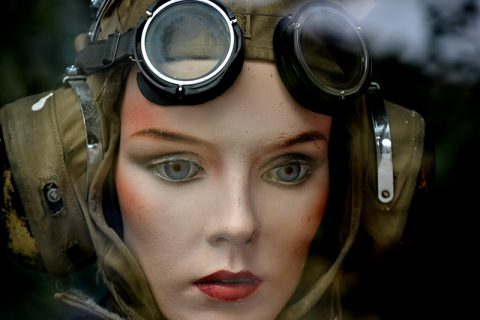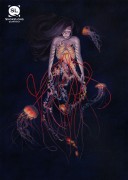You write in “Sea of Love” that “My husband said he envied [the surfers] and purchased a wetsuit the following week, but I never saw him in it. Not even once.” Who is on your list of folks who you would either
a) definitely like to, or
b) definitely not like to
… see in a wetsuit?
This question is not specifically about bodies, though bodies are not out of bounds.
The winter surfers seem to have a spiritual aspect to them (or maybe I’m just elevating their mental state), so I’m going to say I’d definitely like to see the Dalai Lama. I’m guessing he would make a wetsuit look entirely non-silly, perfectly warm, or at least happy; he would catch all the best waves.
You are Canadian, now living in Rhode Island, the U.S.’s smallest state. (As I side-note, I grew up on the Canadian border and America can pry the Cowboy Junkies from my cold dead hands.) I think that Canada scoffs a bit at America, giving us paradigms like Harper/Trudeau or Morissette/Bieber while keeping literature top-notch, as in Munro or Atwood. Please explain.
No one can explain Justin Bieber, no one. Or Harper. They just happen, like natural disasters and crackers that land peanut butter-side down (OK, which do tend to have explanations, but let’s pretend they don’t, because I like this analogy). Literature, on the other hand, is another matter. There are particular Canuck molecules—comprised mostly of spectacular weather patterns, Rick Mercer, and Coffee Crisp bars—that imbue a disproportionate number of the population, somehow resulting in a rich and complex body of literature. There, I have explained.
I’m not saying it’s a good idea, but I can, on demand, sing both Robitaille’s “O Canada” and Hall & Oates’s “Rich Girl” with little to no warm-up. What are your go-to karaoke songs?
I’m impressed. My karaoke machine is busted, I trust no one else’s, and all the jazz I like is nonvocal. Thanks to having kids, however, I could possibly do anything in the Wiggles’ repertoire in a pinch. Those sassy tunes are still banging around in there.
In your story, a hurricane overtakes the former home of the speaker. Can you list your favorite natural disasters or weather events and why?
Hm, I can’t say I have a list where favorite and disaster occur in the same heading; however, I am a weather geek. (Why, oh why, do people disparage weather-talk? Weather is often beautiful to look at, affects clothing choices, and can kill you. What better topic is there?)
Frost: Enter “frost flower” in Google images and prepare to be amazed. Hoar frost is really lovely, too, and more common.
Snow: Any kind. A prickly topic here in Rhode Island, where memories of the Blizzard of ’78 are hauled out every winter and a particular hysteria around snowfall is cultivated (the rush on bread and milk with the slightest forecast of snow is local lore), but snow, and everything that tumbles along with it, is fascinating.
Northern Lights: Maybe not a weather phenomenon per se, but hands down the Stevie Nicks of natural events with all that drapery going on. I saw the lights in Iceland last year and once in northern Ontario when I was in my twenties.
Moon Jellyfish: (Also not a weather event, but.) Apparently as a result of global warming, there was a huge bloom in moon jellyfish off the coast of Rhode Island during late summer, and I found myself swimming in the middle of it. The jellyfish were hard to see at first, because they are translucent white and this was a sea of babies—gazillions of them—so they were very small; also stingless. The sickness of our Earth is a terrible disaster (and very much not a favorite), but the experience of finding myself swimming in this sea of tiny friendly ghost-aliens was unforgettable.
Your debut, Know the Night: A Memoir of Survival in the Small Hours, was released to critical acclaim and was widely reviewed. While it seems that most of the reviews were positive, anything you’d like to say to reviewers with a less-than-stellar verdict?
I take a Zen approach and say nothing. (Ah, but like a placid duck who is pedaling, I do have something under the surface for dealing with meanies: Fashion a clay or a papier-mâché likeness [or your closest guess], remove its teeth [this can be performed in a grisly manner, if you wish], and leave on the roadside in a box labeled FREE TO GOOD HOME. After one moon cycle, the Actual Meanie will be filled with profound and everlasting regret. Works. Every. Time. Or, yeah, just ignore them.)


